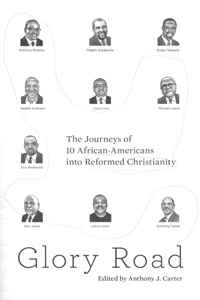
This is a most encouraging book, one that warmed my heart, not only because I know some of the contributors personally and others less intimately but because of what they are writing about. As the editor Anthony Carter writes in the preface, this book is about ten African-American Christians who have hearts for biblical theology and the desire to proclaim the Reformed faith among African-Americans. Carter is also one of the contributors. As the sub-title says, this book contains the testimony of 10 African-America Christians, preachers and teachers of how God brought them to embrace the Reformed faith, its doctrines of grace and biblical theology as well.
Ken Jones, one of the contributors who wrote the introduction has said that this volume is about contemporary Christians who are not ashamed to embrace Reformational Christianity which he said is not only rare for American Christians today, but it is twice as rare for an African-American Christian.
He continues to say that so many African- American Christians are Baptist, Pentecostal, Methodist, quasi-Pentecostal, or into the Prosperity or Social Gospel. From that Jones lays out a good three point outline on Reformed theology. He says that so much of African-American Christianity has been caught up in a type of liberation theology that is simplistic, superficial, and shortsighted. (At this point we recommend reading Anthony Bradley’s Liberation Theology reviewed in the last edition of Equip to Disciple). By the way Anthony Bradley is one of the ten contributors. Bradley, who has taught at Covenant Theological Seminary and now is at Kings College in New York, has spoken at a number of our CEP conferences on training youth leaders and discipleship.
Jones closes his introduction with a good word with which I agree, having read the testimonies, “I must hasten to add that this book is not just “a black thing” with no relevance or bearing outside the black church.”
Buy this book!. Read it joyfully and thankfully for what God is doing among these brothers and their ministries. With all the chaotic cacophonous things being taught in the name of religion and Christianity, pray that God will challenge and use all who identify with biblically Reformed Christianity to make his truth known throughout all the earth.
